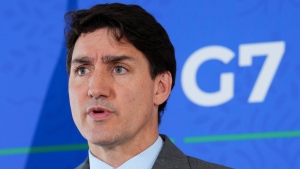Canada Imposes Punitive Tariffs on Chinese Electric Vehicles to Protect Domestic Industry
Prime Minister Justin Trudeau announced on Monday that Canada will impose punitive tariffs on Chinese-made electric vehicles (EVs), following a similar initiative by the United States. The decision, announced during the federal cabinet retreat in Halifax, is part of a broader strategy aimed at strengthening Canada’s emerging EV industry ahead of the federal election expected in October 2025.
The new policy will see a 100 percent surtax levied on all Chinese-made EVs, effective October 1. The move is designed to “level the playing field for Canadian workers,” Trudeau said, ensuring that Canada’s EV industry can compete effectively in North America and beyond. The tariff will apply to a range of vehicles, including electric and hybrid passenger automobiles, trucks, buses, and delivery vans.
Currently, Chinese brands like BYD have a limited presence in the Canadian EV market. However, imports from China have surged recently, partly due to Tesla shifting its Canadian supply from U.S. factories to its Shanghai plant. The new tariffs will affect these Shanghai-made Teslas, likely prompting the automaker to source vehicles for the Canadian market from its U.S. or European plants instead.
In addition to the EV tariffs, Trudeau announced a 25 percent surtax on imports of steel and aluminum products from China, set to take effect on October 15. This measure is part of a broader effort to counter what the Prime Minister described as China’s unfair trade practices, which have undermined the competitiveness of Canadian industries and workers.
“Actors like China have chosen to give themselves an unfair advantage in the global marketplace, compromising the security of our critical industries and displacing dedicated Canadian auto and metal workers. So, we’re taking action to address that,” Trudeau said.
The decision aligns with U.S. efforts to curb the influence of Chinese state-subsidized vehicles in North America. Trudeau’s cabinet consulted with Jake Sullivan, U.S. President Joe Biden’s national security adviser, who emphasized the importance of a coordinated approach among allies.
However, a senior Canadian government official clarified that the tariffs were not imposed due to U.S. pressure. The official noted that Canada had been studying the issue for months, concerned about the potential influx of subsidized Chinese vehicles into North America and the implications for labor and environmental standards.
Flavio Volpe, president of the Automotive Parts Manufacturers’ Association, praised the government’s decision, stating that it is crucial for ensuring fair competition. “The Chinese are very good at what they do, but what they do also includes breaking the rules,” Volpe said, applauding Ottawa’s commitment to protecting the Canadian automotive sector.

